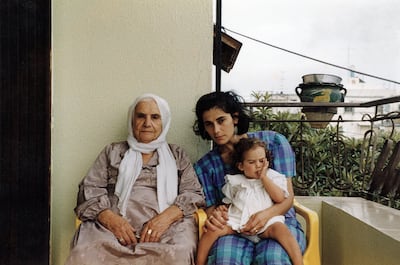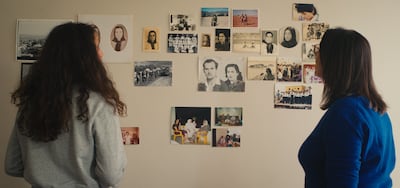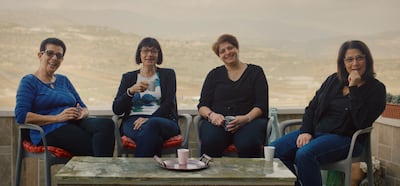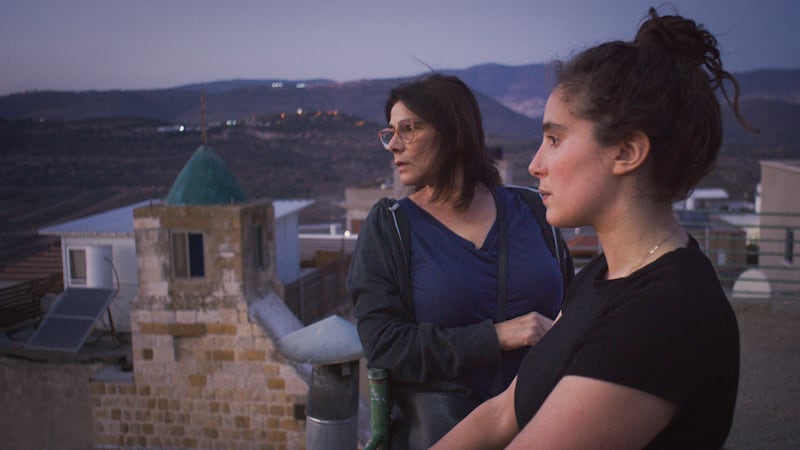The documentary Bye Bye Tiberias is Lina Soualem’s second. It is a beautiful, delicate and intimate tale of four generations of women from the Palestinian side of her family, including her great-grandmother Um Ali, her grandmother Nemat, her mother and actress Hiam Abbass (Succession) and Soualem herself.
After winning London Film Festival's Best Documentary last year, it is coming to Dubai screens this Sunday as part of Reel Palestine at Cinema Akil.
The catastrophic events of the Nakba in 1948, and the seismic ruptures of displacement and trauma it caused Palestinian society and the family, are present throughout the film, as its title suggests. Soualem pieces together their stories (and those of her aunts), weaving them with her childhood memories of annual visits to the family home in Deir Hanna in a kind of filmic tatreez.
“My mother first took me to Palestine when I was 18 months old,” she tells The National. “She would take me almost every year, if not several times a year, to see my family – all of my cousins, my aunts and uncles – for the summer vacation.
“I always felt very close to them, to the village, and [my grandmother’s] house was really our centre.”
Born in Paris to an Algerian father and a Palestinian mother, Soualem explores her diverse cultural roots in her documentaries, unpicking how her identity was undermined by peers and the education system in France.
“I never felt like I could live my different identities when I was younger, at school. I was always judged for not being French enough, not being Algerian enough – or told I couldn't be Palestinian because Palestine doesn't exist,” she says.
“No one was interested in my Arabic language. This is very common for many people of Arab descent in France. We were never valued for our double culture; instead were usually stigmatised for it. When September 11 happened, a girl came to me in class and said: ‘Look at what your people did, the Arabs!’ I was 12 years old and it was very violent for me, there was a lot of aggressiveness.”

Through her mother and their frequent family trips to Palestine, Lina learnt to speak Palestinian Arabic. The film reveals how Lina’s birth helped repair a family rift, which began when her mother opted to leave Palestine against her parents’ wishes, in search of an acting career in France.
Lina was like “an angel that reconciled us”, Abbass tells her in the film.
The mother-daughter bond is beautiful and very clear in the film, especially the childhood VHS footage shot by her father; but their journey in the film also involves the adult Lina asking her mother delicate questions about her past and her family’s past.
Early in the film, Abbass advises her daughter: “Don’t open the gate to past sorrows.” Of course, Soualem does so anyway and such moments are poignant.
Did the process bring them close together?

“I wouldn't say that the relationship changed because of the film – I've always been close to my mother and we had already worked and been together on set,” she says. “I think it's brought us not closer, but more to an ‘equal’ place.
“You usually relate to your parents as a child and during the film, we kind of had to find our balance and exchange ‘woman to woman’. This was something new and that's helping us also deal emotionally with everything that's going on in Gaza. We understand each other in a more natural way … through a natural evolution.”
In Bye Bye Tiberias, Soualem juggles many dichotomies: strength and fragility, closeness and separation, laughter and grief, celebration and mourning, dignity and dehumanisation. She says in the film: “These images of childhood conceal the reality of a place that may disappear any day now. These images are my memory’s treasure. I don’t want them to fade. I know that they too might sink into oblivion.”
The words today seem uncannily prophetic.
The archive footage Soualem uses of Palestinian families fleeing their homes with what they could carry, of Zionist militias destroying Palestinian homes and of survivors searching the rubble for belongings, or perhaps loved ones, is eerily reminiscent of the horrors Palestinians have been facing in Gaza – with the world watching – since October 7.

Bye Bye Tiberias was released before October 7, and Soualem and Abbass couldn’t have imagined what subsequent screenings would feel like – for them or for audiences. Its UK premiere was at the London Film Festival in October, where it picked up the aforementioned prize.
“It was all very, very intense because everything was happening while we were trying to understand what was going on,” Soualem says. “I was facing audiences with the film and I was very frightened by the potential backlash.
“It was difficult to go through it because the dehumanisation of Palestinians over those first days and weeks was so violent, but at the same time I was showing the film and receiving a lot of warmth. It was weird to live these two things at the same time. That gave me a lot of strength to go through this period because it wasn't easy. I was really afraid everywhere I arrived and was always positively surprised by the audiences.”
Soualem says that what is unfolding in Gaza is devastating but not surprising, and that “cycle” is regrettably part of the fabric of the narrative that runs in her film.

“It's not shocking in the sense that we always knew that this story has been repeated over the years,” she says. “It’s a cycle. We inherited from our ancestors this fear of loss that is continuous so it's as if the fear is now proven.
“Nothing is new, just the shock of the amount of people killed and injured, and the fact that it's live and there is little reaction. For my mother and for older generations that actually lived through it in the past, it has triggered that trauma again.
“When I started writing the film six years ago, I wanted to give these remarkable women back their humanity and their complexity through the film, because they are often portrayed in a dehumanised way. People always talk about Gaza as a separate thing from the rest of Palestine, as if the people of Gaza are Hamas, but a great percentage of the people in Gaza are already refugees from other parts of Palestine.
“So when you see the stories of my family, it's by chance that some Palestinians remained, internally displaced, while others became refugees. Almost every person in Gaza is the child or the grandchild of a Palestinian refugee.”
In the film, Soualem says: “I wonder if we can manage to find ourselves truly in a world we invented.”
For now, she is doing that, with great love and reverence for her family and culture, through her art.
Bye Bye Tiberias will be screened at 7pm on Sunday as part of Reel Palestine at Cinema Akil, Dubai. The screening will be followed by a Q&A with Lina Soualem. More information is available at cinemaakil.com






